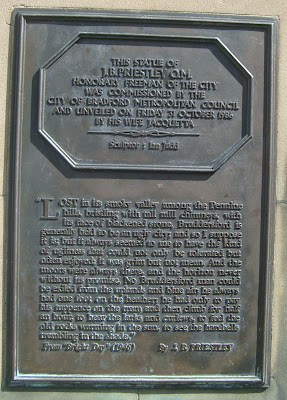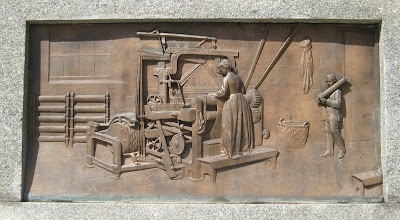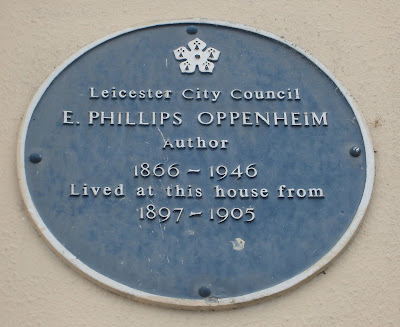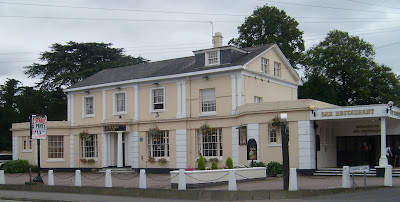
The writer J. B. Priestley (1894–1984) was born in Bradford, West Yorkshire, and his imposing statue, with coat tails flying in the wind, is on the outskirts of the city's West End, by the National Media Museum on Princes Way.

On the plinth is a plaque which states 'This statue of J. B. Priestley[,] O. M.[,] honorary freeman of the city[,] was commissioned by the City of Bradford Metropolitan Council and unveiled on Friday 31 October 1986[,] by his wife Jacquetta'.
The sculptor was Ian Judd, and the plaque continues with a quotation from Priestley's Bright Day (1946). He used to fictionalize Bradford as 'Bruddersford':
'Lost in its smoky valley among the Pennine hills, bristling with tall mill chimneys, with its face of blackened stone, Bruddersford is generally held to be an ugly city; and so I suppose it is; but it always seemed to me to have the kind of ugliness that could not only be tolerated but often enjoyed; it was grim but not mean, and the moors were always there, and the horizon never without its promise. No Bruddersford man could be exiled from the uplands and blue air; he always had one foot on the heather; he had only to pay his tuppence [two old pence, equivalent to 0.66p] on the tram and then climb for half an hour, to hear the larks and curlews, to feel the old rocks warming in the sun, to see the harebells trembling in the shade.'
In 1958, Priestley very publicly re-visited Bradford for the filming of 'Lost City' to record his impressions of how it had changed since he lived there in his youth. His guide, journalist Mavis Dean, joined him at Forster Street Square train station.
The documentary showed 5 Saltburn Place – in Manningham in the north-west of Bradford – where Priestley had lived and where he began writing. A plaque remembers his time here, although he never wrote about 'Bruddersford' here. He remembered making bookcases out of orange boxes and writing a poem about Atlantis.


Priestley remembered going to nearby Lister Park every Wednesday and Saturday in the summer months to listen to the brass band. The bandstand was much as it was in Priestley's youth, and is probably so today.

They passed by the imposing Listers Mill, a former silk warehouse now turned into flats.

But the textile Bradford was renowned for was wool. Priestley was hardly cut out for office tasks, although he worked as a clerk for a wool firm in Swan Arcade, Broadway, from 1910–14, and commented that he must have been one of the worst wool clerks ever. He detested the demolition of Swan Arcade.
Lister Park displays several cameos of various stages of the wool industry around the statue of the inventor and industrialist Samuel Cunliffe Lister (1815-1906) at the main entrance to Lister Park.

.jpeg)




Priestley also saw the Bradford Playhouse in Little Germany, which he said had not changed a great deal since his youth, although today it is also a film theatre, has jazz nights, and is known as The Priestley:


During the making of the documentary, Priestley stayed at the Midland Hotel in Cheapside, where his attempts to make contact with the friends of his youth by telephone were unsuccessful. He remarked that many of them were killed in World War I.








